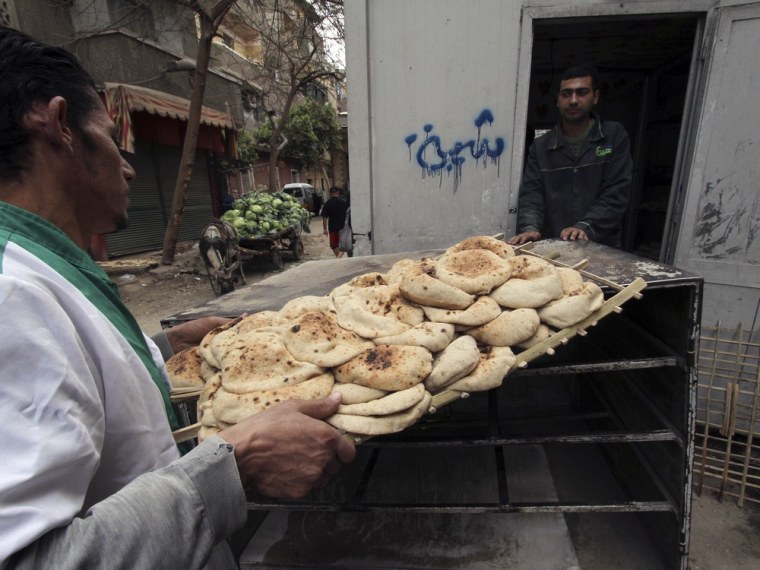In the gritty gusts of a sandstorm, men in turbans and women in veils stood uncomplaining for hours outside a ramshackle kiosk, lined up for their daily loaves of "life."
Political change may be remaking Egypt, but "we trust in God that the bread's going to stay cheap," said Shadia Abdul Halim, 45, a mother of six patiently queued up to buy.
Bread has stayed cheap even as Egypt's other food prices leaped upward by 17 percent last year — cheap because the government pays for most of it.
Twenty of the flat, round pieces of local "eish" — "life" in Arabic, the word Egyptians use for the staple — cost just one Egyptian pound. That's the equivalent of 17 U.S. cents for more than 2 kilograms (more than 5 pounds) of bread.
But halfway around the world on this day, on a Chicago trading floor, the price of wheat edged up again, raising the pressure another notch on poorer states like Egypt that have made subsidized bread a fixture of Arab life, an increasingly unaffordable one.
The Middle East's bread subsidies are just one dilemma in a world facing a potential food crisis this year, like the troubles in 2008, when skyrocketing prices touched off riots in developing countries.
The U.N. global food price index hit a record high in February, surpassing even 2008's peak. The average price of wheat so far this year, $346 a ton, is more than double 2005's price. The reasons for the increases are various — growing demand, impact of higher oil prices, diversion of corn to ethanol. Drought and floods have cut into wheat production, possibly previewing what some analysts say will be growing global grain shortages.
The head of the U.N.'s World Food Program said hard-pressed governments are being pushed toward cutting food subsidies, at great risk.
"When it comes to food, the margins between stability and chaos are perilously thin," Josette Sheeran said in a statement on the Middle East situation.
How much could bread prices rise for poor Arabs?
"Without the subsidy, it would triple the price," said Abdul Elah H. al-Hamawi, president of the bakers' association in nearby Jordan. "There would be a revolution!"
Egypt has already had a revolution, the ouster of President Hosni Mubarak, in the wave of political protest sweeping the region, ignited in part by higher food prices. Now whatever government emerges in Cairo will have to grapple with the subsidy dilemma.
Under the half-century-old system, a "safety net" for Egypt's poor, the government sells cut-rate wheat flour to bakeries for mandatory production of "baladi," or local, bread.
"Bread inspectors" enforce the mandate, but leakage still occurs, as unscrupulous bakers siphon off flour to sell at higher rates to producers of finer, unsubsidized baked goods. Subsidized bread also "leaks" to better-off Egyptians, since anyone can buy it.
Half of Egypt's 80 million people rely on the everyday "baladi eish." Bread accounts for one-third of Egyptians' calorie intake, and some blame it for the fact that people here on average are more obese than even Americans.
But the bread program is credited with having eased malnutrition and child mortality, and has become a symbol of the "social contract" between Egypt's governments and its people.
Along the way, however, it has also fattened the import bill, as the population exploded.
From wheat self-sufficiency, Egypt has become the world's biggest wheat importer. The government buys more than half the country's needs on the international market. A decade ago, the basic market cost for those imports was about $700 million a year. This year it could top $3.5 billion, for 10 million tons of wheat.
In Jordan, 99 percent dependent on imports, "our budget has been increasing about 10 to 12 percent a year for the subsidies," Emad A. al-Tarawneh, that government's chief wheat importer, said in Amman.
Although global grain prices dropped in recent weeks because of world events, "our prediction is that prices will continue to go up, same as in 2008," he said.
To end or not to end the subsidy
Here in Cairo, the agronomist known as the "father of Egyptian wheat" for his work improving the local crop, said the subsidy should end.
"Otherwise the government cannot afford it all," Abdel Salam Gomaa said. "And the rich are benefiting more than the poor. They don't buy to consume but to feed the cattle and animals" — with bread cheaper than animal feed.
"But now, with the revolution, it's not the time to talk about removing subsidies," Gomaa added.
Instead, to counter a tightening global market, he is promoting a plan to boost domestic wheat production, through stepped-up research for better-yielding local seed, reclaiming land for cultivation, financial support for farmers' purchases of costly fertilizer, herbicide and irrigation.
For the Arabs and their bread, however, other challenges lie ahead.
Gomaa says climate change — warmer temperatures — is already cutting into Egypt's wheat yield. Across the Red Sea, Saudi Arabia's bid for wheat self-sufficiency, successful for two decades, has crashed as an underground water table runs dry. Even Jordan's small grain crop is threatened by rains that have turned unreliable.
Back at the kiosk, baker Essam Hosni, 29, arrived to tell the patient crowd their eish would soon be delivered.
What did he think of the revolution? It's good, he said: "The bread inspectors have stopped asking for bribes." But what if a new government rethinks the wisdom of cheap bread?
"No, no. They can't do that," the baker said. "The whole world would collapse if that happened."
